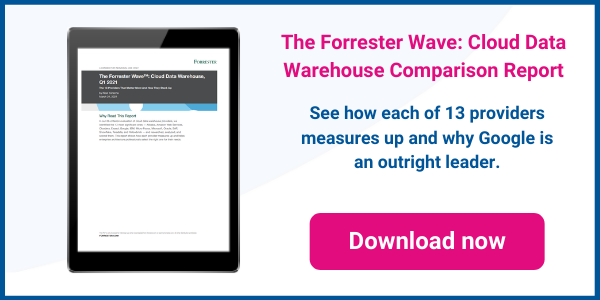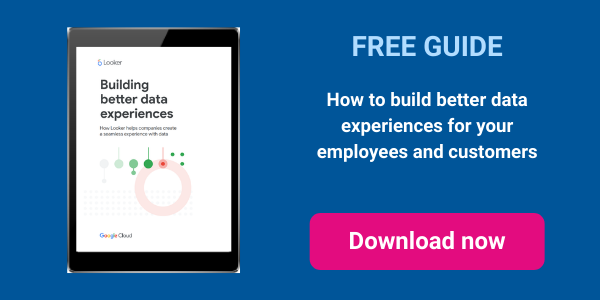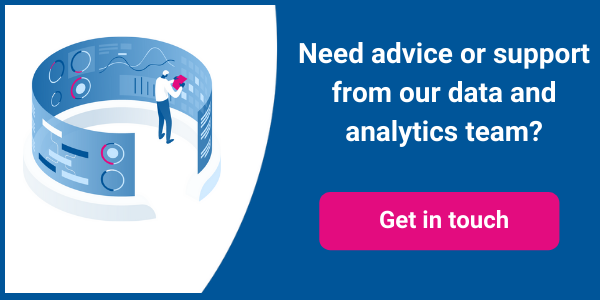Far too many data analytics projects fail to deliver the promised value because they don’t provide actionable insights to decision makers quickly enough. With the volume of data now available to businesses growing rapidly — at up to 65% a year, according to IDC — and new techniques like machine learning promising significant competitive advantages, you need data analytics applications that can tackle these computationally intensive tasks on demand and at speed.
Google Cloud Platform (GCP) provides a robust, secure hyper-scalable infrastructure that can affordably solve your immediate need for speedy, accurate data analytics while having the scalability to grow with your business. It provides a wealth of features and tools to ensure your data analytics applications are quick and responsive at every stage, no matter much data you’re handling, how many users you’re serving, or how complex your analysis needs.
1. A hyper-scalable cloud data warehouse
BigQuery, Google’s cloud data warehouse platform, is hyper-scalable, capable of executing SQL queries over petabytes of data and automatically scaling on-demand to match your current needs.
Recently pitched against leading competitors by gaming giant King, BigQuery topped the charts across several benchmarking exercises involving 10 trillion row queries. And because it runs on a serverless cloud architecture, BigQuery eliminates tasks such as provisioning hardware, re-configuring clusters, or tuning performance.
2. Fast, flexible data ingestion and transformation
GCP offers an ecosystem of code and no-code options for building robust data ingestion and transformation pipelines to support a wide range of streaming, batch and near-real time data sources.
Again, you’ll be benefitting from solutions running on GCP’s automatically scaling serverless architecture, allowing data to be ingested and transformed at a speed to match your business needs. And because transformations can be handled within BigQuery, you won’t have to worry about the performance issues that can be created by moving data between systems for storage, cleansing and transformation.
3. Data organised for consumption in the presentation layer
GCP offers a usage-based pricing model that means it’s cost effective to take a multi-layered approach to your data. In other words, you can afford to store the same data in its raw state, after it's been cleansed and then when it's been transformed and organised for consumption. That helps minimise the processing needed to serve dashboards and self-serve analytics to users, without compromising your ability to return to the raw data if you want to apply different transformations.
4. Responsive dashboards and self-service analytics
Many business users are frustrated with their data analytics solutions because of sluggish performance when loading dashboards, running reports and drilling down into the detail.
GCP provides tools such as Looker that give users fast, responsive access to data by leveraging the scalability of BigQuery and its ability to execute the entire SQL query in the database. This avoids computationally expensive in-memory joins, which are the main cause of scalability issues in other visualisation tools.
Looker supports a range of popular visualisations out of the box, enabling teams to quickly design engaging and action-driven dashboards.
You can also take advantage of its hyper-scalability by creating custom visualisations in JavaScript, using the powerful D3 library. And if Looker doesn’t meet your specific needs, you can turn to the wealth of tools provided by Google’s ecosystem of partners, which also take advantage of the same hyper-scalable infrastructure.
5. Machine learning tools that deliver at the speed of business
ML projects can have a big impact on your operations and give you a competitive advantage, with projects typically delivering an ROI of between 200% and 500%.
Netflix, for example, estimates it saves $1 billion a year by using its ML-powered recommendation engine to reduce subscriber churn. But ML typically requires elastic computing resources and massive processing power. That’s why Google has built tools like BigQuery ML and Cloud AutoML on top of BigQuery, allowing them to take advantage of the hyper-scalable features in BigQuery and the rest of the GCP platform.
For Play Sports Network, for example, we were able to develop a recommendation engine that ingests new data hourly and takes just 2.5 hours to generate a multi-billion row table each day that contains personalised recommendations for millions of users.
A project for another client, QiH Group, demonstrates the difference you can make to your business operations with well-designed data analytics applications based on GCP’s hyper-scalable solutions. We were able to help QiH Group cut the time taken to produce reports from up to ten minutes to just seconds, while also improving the reliability of data ingestion so users had greater confidence in the results — and, at the same time, significantly reduce the cost of providing fast, accurate reporting to business users.
Working with our data analytics and AI team
Our Data, Analytics and AI practice brings together a highly committed team of experienced data scientists, mathematicians and engineers. We pride ourselves in collaborating with and empowering client teams to deliver leading-edge data analytics and machine learning solutions on the Google Cloud Platform.
We operate at the edge of modern data warehousing, machine learning and AI, regularly participating in Google Cloud alpha programs to trial new products and features and to future-proof our client solutions.
We have support from an in-house, award winning application development practice to deliver embedded analytics incorporating beautifully designed UIs. We are leaders in geospatial data and one of the first companies globally to achieve the Google Cloud Location-based Services specialisation.
If you'd like to find out more about how we can help you build your own modern data and analytics platform, why not take a look at some of our customer stories or browse our resources. Needless to say, please get in touch with our team if you'd like more practical support and guidance.



